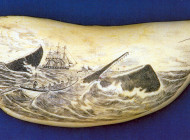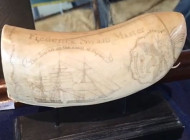By W.A. Demers
HARTFORD, CONN. — About a dozen antiques dealers and other ivory ban opponents gathered here on March 4 as the state’s environment committee conducted a public hearing in the Legislative Office Building on the matter of SB 227, or “CECIL Law.” Said Rob Mitchell of the Elephant Protection Association in an email that went out a few days before the hearing, “Preying upon animal rights groups’ propaganda about Cecil the lion, Connecticut introduced SB 227 that would make it a felony to own any object containing any elephant ivory. That’s right — two years in prison and a $10,000 fine for owning a piano with ivory keys, an antique cane with an ivory handle or a shotgun with an ivory sight bead Unless people show up to testify, especially Connecticut voters, this bill or something very close to it is likely to pass.”
Opposition to the ivory ban at the hearing was loud and clear, according to Colchester, Conn., dealers Arthur Liverant and Kevin Tulimieri, who added their thanks to everyone who submitted written testimony and stayed through a long day to provide a voice to the antiques trade’s concerns. “We were honored to have Dr Thomas Loughman, director and chief executive officer, and Linda Roth, senior curator, from the Wadsworth Atheneum stand up and support the cause of historic and artist preservation,” said the dealers.
Among the other notable speakers were Rosie DeStories, co-owner of Fairfield Auction in Monroe and David Schorsch of Woodbury.
“Testifying at a hearing like this was a new experience for me,” said Schorsch, who like many there invested a good 8½ hours of his day. “So I’m not sure what is normal or not. But I will say that being cut off after only two minutes into my testimony and then getting a ‘no’ from the committee when I asked if there were any questions, was very disappointing.”
Schorsch added that he was also struck by the great contrast between a segment of the hearing that dealt with a “real and serious” national issue, such as the decrease in pollinating insects and what that means for the food chain, and the poaching of elephant ivory and rhino horn, which many who testified against the measure said has clearly been shown not to be a problem in terms of the United States.
SB 227, the so-called “CECIL Law” — CECIL being an acronym for Conserving Ecosystems by Ceasing the Importation of Large Animal Trophies — also pays homage to the beloved Zimbabwean lion Cecil, who was killed by an American trophy hunter in July 2015. The senseless killing appalled people everywhere and spurred legislators to begin crafting legislation to curb trophy hunting. Beginning with New Jersey, a host of states began introducing bills that would ban trafficking in the “Big 5 African Species,” a grouping that includes elephants, lions and rhinos.
“This bill is particularly bad because it goes beyond trade to criminalize possession of any specimen from any named species,” said Mitchell, an attorney and political consultant representing small businesses. “The only exception for private owners is if you, one, own a specimen in the state before the law was passed and two, get a ‘certificate of possession’ from Connecticut’s Commissioner of Energy and Environmental Protection. Even if you get the certificate, you cannot sell or trade any covered item. No exceptions for people who come to Connecticut after the law is passed. No exceptions for people who bring ivory or other covered items into the state.”
Mitchell further faults animal rights groups for using antiques and musical instrument exemptions to “divide and conquer people who own and trade legal ivory. Here is a prime example of what they will continue to push for. This bill even goes so far as to explicitly authorize searches and seizures in people’s homes if ‘any law enforcement officer’ gets a warrant based on probable cause belief that you own a piece of ivory or other covered specimen.”
In his testimony, Schorsch, whose Woodbury business is a well-known stop along Connecticut’s “Antiques Trail,” presented an economic argument for the Connecticut lawmakers to consider. “In my opinion, the proposed ban on ivory in Connecticut will take a devastating economic impact on a large number of honest and knowledgeable dealers, jewelers, auctioneers, museums, educational institutions and private citizens throughout the state — those who reputably inherit, buy and sell genuine ivory antiques. If this ban is allowed to proceed, it will inflict irreparable and permanent damage to the economy, but much more importantly, to the cultural patrimony of our state and our country.”
Meanwhile, on March 3, the day before the hearing, which was designated as World Wildlife Day, a group calling itself the US Wildlife Trafficking alliance announced major corporate commitments to combat wildlife trafficking. The group said that 16 leading US companies are among those making substantial commitments to send a signal to traffickers that they will not turn a blind eye to criminal activity, and that the US market is closing its doors to illegal products.
Leading the way in the e-commerce sector is Google, eBay and Etsy; Ralph Lauren for the fashion industry; for the jewelry sector, Tiffany & Co., Signet and the Berkshire Hathaway companies, Richline Group and Rio Grande; LiveAuctioneers.com in the auction industry; for the travel industry, JetBlue, Royal Caribbean Cruises Ltd, Natural Habitat Adventures and the Adventure Travel Trade Association. Discovery Communications has also stepped up, committing to using their networks and programming to educate consumers about the issue. The Bronx Zoo and other members of the Association of Zoos and Aquariums will educate their visitors, which number more than 180 million each year.
In terms of Connecticut, the CECIL Law hearing, however, was only round one. The issue returns on Friday, March 11, as a public hearing for Raised Bill No. 5578, “An Act Prohibiting the Sale and Trade in Ivory and Rhinoceros Horn,” is scheduled to begin at 12:30 pm. With an effective date of July 1 of this year, the proposed bill is similar to existing law in New York and New Jersey, providing exemptions for musical instruments or an antiques, provided “such ivory was removed from the wild prior to February 26, 1976, if such ivory is elephant ivory; such ivory is a fixed component of a larger manufactured item and is not, in its current form, the primary source of the total value for such item; the total volume of the ivory component is less than twenty percent.”
The text of this bill is at www.cga.ct.gov/2016/TOB/h/2016HB-05578-R00-HB.htm.
Colchester, Conn., antiques dealers Arthur Liverant and Kevin Tulimieri are again urging action to oppose Raised Bill No. 5578. The Friday, March 11, hearing begins at 12:30 pm, at the State Legislative Office Building, 300 Capitol Avenue, Hartford, CT. Signup begins at 8:15 am.
“It is critical to have a large turnout on Friday to make sure the Environment Committee understands this ban would be harmful to antiques collectors, dealers, historical societies and museums, and likely to the endangered species themselves,” said Liverant.
The dealers have provided a suggested letter, which participants are welcome to cut and paste into their own message to be submitted to: Public Testimony to the Environment Committee at envtestimony@cga.ct.gov. Make sure to put “Opposition to H.B. No. 5578” in the subject line of the email.




